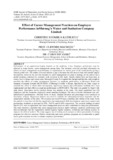Effect of Career Management Practices on Employee Performance in Murang’a Water and Sanitation Company Limited.

View/
Date
2021-06Author
Kathukya, Christine S.
Machogu, Clifford
Mwangi, Caroline Igoki
Metadata
Show full item recordAbstract
Performance of an organization largely depends on the workforce it has. Employee performance may be affected by many factors, career management among them. The literature reviewed provided information on effects of career management on performance in organizations in various parts of the world thereby giving a limited global view. The studies reviewed indicate a gap in literature that this area of study still remains largely un-explored, shown by the fact that literature on career management in Kenya is lacking, yet the subject has a global attention evidenced by scholarly work reviewed in this study. Similar studies have not been done at county level in Kenya and in particular, Murang’a County. It is against this background that the study sought to establish the effects of career management practices on employee performance in Murang’a Water and Sanitation Company Limited (MUWASCO) in Murang’a County in Kenya. Specifically the study sought to establish the extent to which skills development, supervisory support and performance feedback have been implemented and their effect on employee performance in MUWASCO. The study was guided by Super’s life span theory. Descriptive survey research design was adopted in the study. The target population was 150 employees and the researcher employed census sampling technique. The data collection instrument was selfadministered questionnaires. Absolute forms of mean, standard deviation and percentages were employed in descriptive analysis. Regression analysis was used to establish the relationship between dependent and the independent variables of the study .The response rate was 85% hence reliability and validity of the study. From the analysis it was observed that the organization has implemented skills development, supervisory support and performance feedback as indicated by 39%, 70.47% and 81.89% respectively. The research findings revealed that 84.25% were in agreement that career management practices have contributed to employee performance. The study therefore concluded that career management practices highly influence employee performance and thus recommends that the organization should organize regular seminars, workshops and training sessions to improve the skills of workers. The study suggests use of training needs analysis to inform preparation of training programs for effective outcomes. Further, mentorship and career guidance programs are recommended to guide career goals and plans in order to enhance employee performance.
URI
http://www.iosrjournals.org/iosr-jhss/papers/Vol.26-Issue6/Series-12/E2606124353.pdfhttps://www.researchgate.net/figure/Department-of-the-Respondents_fig1_352904101
http://hdl.handle.net/123456789/4727
Collections
- Journal Articles (BE) [333]
